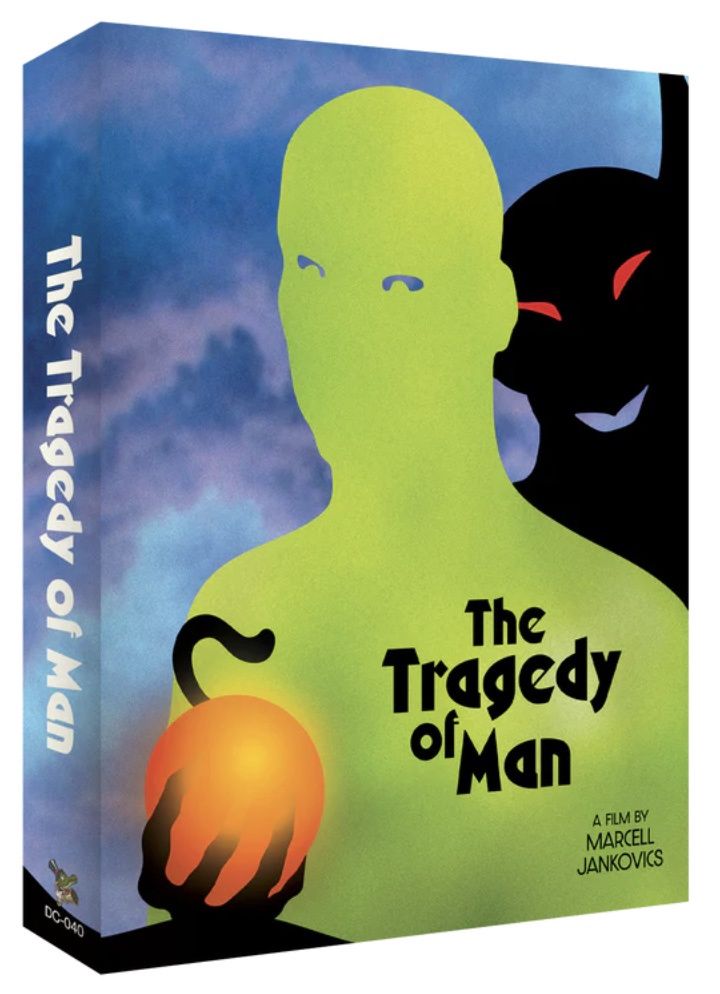Canada Post Strike
Tragedy of Man - Deluxe Limited Edition (Blu-ray) ***Preorder*** 6/30
$57.99
PRE-ORDER
Loyalty
Buy and earn $0.57 Loyalty for your next purchaseLoyalty is a discount program that lets you buy products and earn points to redeem on your next purchase. Your Loyalty balance is updated when you pay online or in-store. The Loyalty amount shown on this page can be recalculated at the checkout.
Out of stock, available for pre-purchase
Product Details
Brand: Deaf Crocodile
Format: Blu-ray
Boxset Surcharge: $4.99
Import: US
LIMITED DELUXE EDITION (1250 UNITS)
THE TRAGEDY OF MAN (AZ EMBER TRAGÉDIÁJA), 2011, Mozinet, 160 min. An incredible 23 years in the making, THE TRAGEDY OF MAN is the legendary Hungarian animator Marcell Jankovics’s (SON OF THE WHITE MARE) sprawling, kaleidoscopic masterwork: a seemingly-endless animated scroll of gorgon-like demons, cave paintings that spring to life, barbarian warriors, bejeweled pharaohs, knights and martyrs and prophets bleeding together -- one brutal age dissolving into another and another, all of human history passing like pages in a flipbook. Adapted from the dramatic poem by 19th century author Imre Madách that’s often compared to Goethe’s Faust and Milton’s Paradise Lost, THE TRAGEDY OF MAN is no children’s cartoon: it’s one of the most visually stunning and wildly ambitious animated epics ever made (and then some). Out of the galactic void at the beginning of the story emerges Lucifer the Devil, the Great Winged Bat, Anubis, the antagonist who adopts many faces and forms as it guides and manipulates the characters of Adam and Eve throughout history, searching for the purpose of human existence -- if there is one. Broken into 15 different episodes (the segments were produced one at a time by Jankovics as he cobbled together funding), each section has a different visual style, incorporating a mindblowing tapestry of world art, cultures, symbols, and rituals. In ancient Egypt, the bodies of slaves become the literal building blocks of the pyramids – in ancient Greece, the background shatters like broken pottery – in Rome, mosaics of gladiators come to life, slashing at each other – in the Middle Ages, arguing zealots are transformed into Orthodox churches, clashing against one another as they crumble. The sum total of Jankovics’s cosmic vision of human “progress” is utterly surreal, psychedelic, operatic and Wagnerian: a breathtaking Hieronymus Bosch-like triptych of Hell on Earth, with brief glimpses of Grace and Love which may offer hope for the future. As Adam, in the guise of the German astronomer Johannes Kepler, whispers: "In this world I have need of nothing except the night and shining stars, the secret harmony of the spheres." In Hungarian with English subtitles.
Special Features
-
New video interview with key animator Piroska Martsa and background artist István Orosz, moderated by Dennis Bartok of Deaf Crocodile.
-
New video interview with György Ráduly, director of the National Film Institute (NFI) – Film Archive on the history of Hungarian animation and the career of Marcell Jankovics, moderated by Dennis Bartok.
-
New visual essay by film historian Evan Chester.
-
New commentary track by animation producer and podcaster Adam Rackoff, podcaster and film critic James Hancock, and filmmaker and podcaster Martin Kessler.
-
Blu-ray authoring by David Mackenzie of Fidelity In Motion.
-
New art by Beth Morris
Deluxe Edition Bonus Content
-
Slipcase featuring new illustration by Beth Morris.
-
60-page illustrated book
-
New essay by PEN Award-winning historian and esoteric author Mitch Horowitz
-
New essay by film critic Walter Chaw
Save this product for later
Tragedy of Man - Deluxe Limited Edition (Blu-ray) ***Preorder*** 6/30
Display prices in:CAD

